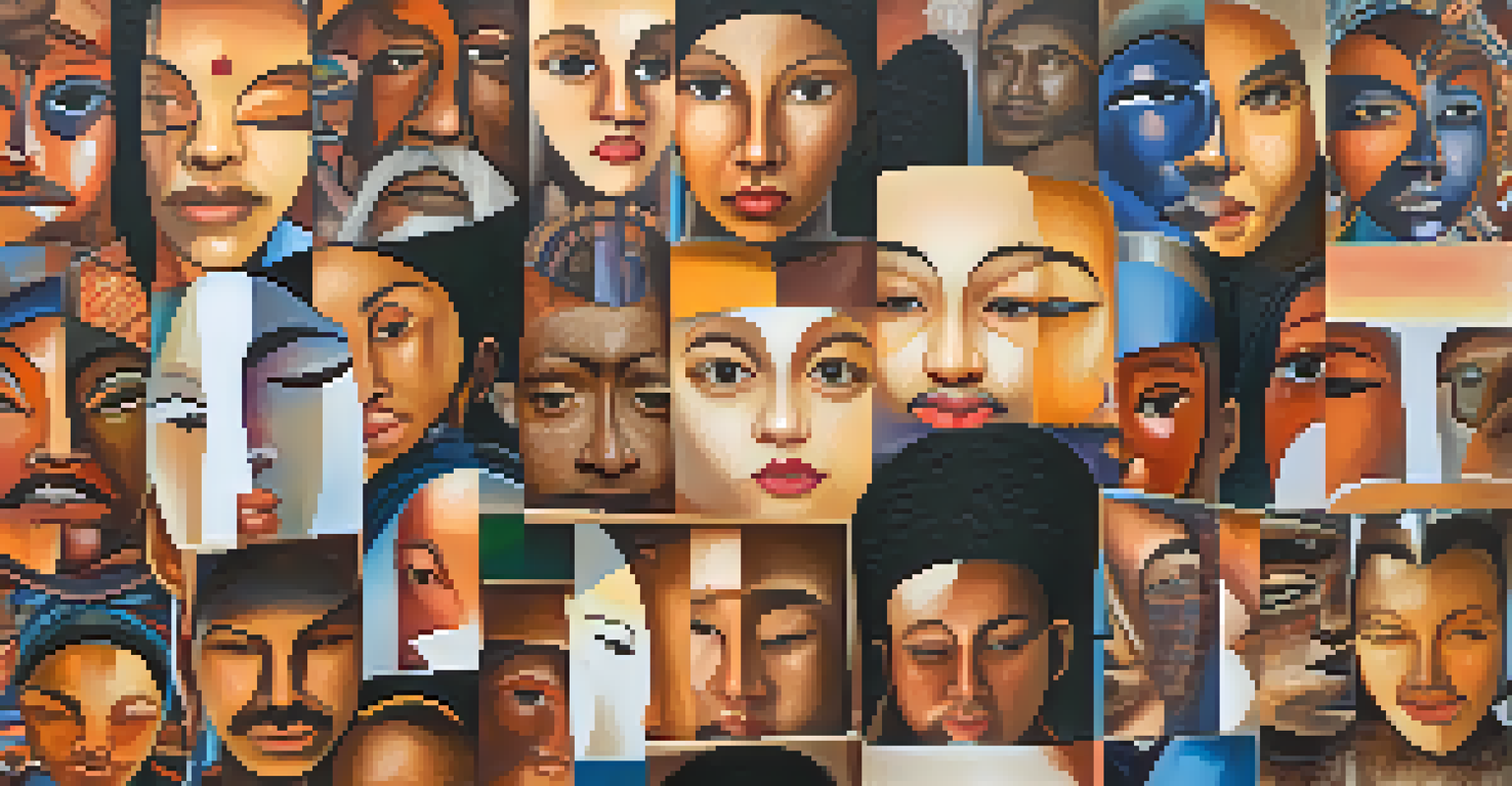Cultural Perspectives on Entheogens and Self-Identity

Understanding Entheogens and Their Cultural Roots
Entheogens are substances that have been used for centuries in various cultures to facilitate spiritual experiences. These substances, like psilocybin mushrooms and ayahuasca, are often integral to rituals and practices aimed at understanding the self and the universe. For many Indigenous people, these plants are more than just tools; they are sacred gifts that connect them to their ancestors and the earth.
The use of entheogens can open up a pathway to deep healing and self-discovery, revealing aspects of ourselves we may not have confronted otherwise.
In societies where entheogens are utilized, they often serve as a bridge between the material and spiritual worlds. For instance, in the Amazon basin, ayahuasca is not just a drink; it’s a pathway to healing and insight. This cultural context enriches the experience, transforming a simple ingestion into a profound journey of self-discovery.
As we explore these cultural perspectives, it becomes clear that entheogens are deeply embedded in human history. They have shaped beliefs, practices, and even social structures. This understanding invites us to reflect on our own relationship with these substances, considering their potential to influence our self-identity.
The Role of Entheogens in Spiritual Practices
In various cultures, entheogens play a pivotal role in spiritual practices, often guiding individuals through personal transformation. For instance, in the Native American Church, peyote is used as a sacrament to foster a deeper connection with the divine. Participants often report feelings of unity and clarity, which can lead to significant shifts in self-identity.

These experiences can be life-altering, as individuals may confront past traumas or gain new perspectives on their lives. The integration of these insights can foster a sense of wholeness and purpose, illustrating how entheogens serve as catalysts for personal growth. This transformative potential highlights the importance of cultural context in shaping these experiences.
Entheogens Enhance Spiritual Practices
Entheogens serve as powerful tools in various cultures for personal transformation and deeper spiritual connections.
Moreover, the communal aspect of these practices enhances their impact. Sharing these journeys with others creates bonds and a sense of belonging, further reinforcing individual identity within a cultural framework. The power of entheogens goes beyond the individual, resonating through communities and traditions.
Comparative Analysis: East vs. West Perspectives
When examining cultural perspectives on entheogens, a striking contrast emerges between Eastern and Western approaches. In Eastern traditions, such as Hinduism and Buddhism, entheogens are often viewed as tools for enlightenment and self-realization. They are integrated into practices like meditation, where the goal is to transcend the ego and connect with a higher self.
Entheogens are not just substances; they are catalysts for personal and collective transformation, allowing us to explore the depths of our consciousness.
Conversely, in Western contexts, entheogens have historically been stigmatized, often associated with counterculture movements and recreational use. However, recent shifts toward acceptance and research in therapeutic settings suggest a growing recognition of their potential benefits. This evolution reflects an ongoing dialogue about the nature of self and the role of substances in enhancing our understanding of it.
This comparative analysis underscores the importance of cultural narratives in shaping our relationship with entheogens. The Eastern perspective emphasizes unity and transcendence, while the Western view is gradually moving toward a more integrated understanding of self and healing. Both perspectives offer valuable insights into the complex interplay between culture and self-identity.
Personal Narratives: Stories of Transformation
Personal narratives surrounding entheogens often reveal profound transformations that individuals experience. For example, many who have participated in guided ayahuasca ceremonies describe a journey of self-discovery that leads to healing from past traumas. These stories serve as powerful testimonies to the potential of entheogens to foster change.
One common thread in these narratives is the experience of confronting one’s fears and insecurities. Individuals often report feeling a sense of clarity and acceptance that was previously elusive. This journey not only reshapes their relationship with themselves but also influences how they interact with the world around them.
Cultural Context Shapes Experiences
The use of entheogens varies significantly between Eastern and Western perspectives, influencing individual identities and societal norms.
These personal stories highlight the subjective nature of entheogenic experiences. While some may find deep spiritual insight, others may grapple with challenging emotions. Regardless of the outcome, the impact on self-identity is undeniable, suggesting that these experiences are as diverse as the people who encounter them.
The Intersection of Science and Spirituality
In recent years, scientific research has begun to explore the mechanisms behind the effects of entheogens on the brain and consciousness. Studies have shown that these substances can alter neural pathways, leading to enhanced creativity, emotional release, and even a sense of interconnectedness. This intersection of science and spirituality opens new avenues for understanding the self and consciousness.
For instance, research on psilocybin has demonstrated its potential to alleviate depression and anxiety, suggesting that entheogens can play a therapeutic role in modern mental health treatments. This scientific validation adds a layer of credibility to the spiritual experiences many individuals report. It also raises questions about how we define self-identity in the context of both biological and spiritual frameworks.
As we continue to delve into this intersection, it becomes clear that science and spirituality are not mutually exclusive. Instead, they can complement each other, providing a more holistic view of human experience. This evolving landscape encourages us to rethink our understanding of self and the role of entheogens in shaping that understanding.
Societal Impacts of Entheogen Use
The societal impacts of entheogen use are multifaceted, influencing everything from mental health to social justice. In many cultures, the use of these substances is tied to community rituals that reinforce social bonds and cultural identity. As such, entheogens can play a significant role in fostering a sense of belonging and purpose among individuals.
However, the resurgence of interest in entheogens in Western societies has sparked debates about their ethical use, particularly regarding cultural appropriation. As more people seek out these experiences, it’s crucial to acknowledge and respect the traditions from which they originate. This awareness can promote a more equitable approach to entheogen use, ensuring that Indigenous voices are heard and valued.
Science Validates Spiritual Insights
Recent research into the effects of entheogens bridges the gap between scientific understanding and spiritual experiences, highlighting their therapeutic potential.
Moreover, the potential for entheogens to address mental health issues highlights their societal relevance. As discussions about mental health become more open, entheogens present an alternative avenue for healing. This shift in perspective encourages a broader conversation about the role of these substances in our lives and their potential to reshape societal norms.
The Future of Entheogens and Self-Identity
Looking ahead, the future of entheogens in relation to self-identity is promising yet complex. As society becomes more accepting of these substances, we may witness a shift in how they are integrated into personal and cultural practices. This evolution could lead to new frameworks for understanding self and consciousness, merging scientific insights with spiritual traditions.
The ongoing research into the therapeutic benefits of entheogens also paves the way for a more nuanced understanding of mental health. As we learn more about their effects on the brain and emotional well-being, they may become valuable tools in addressing societal challenges. This potential could reshape our collective identity and how we view mental health care.

Ultimately, the journey of understanding entheogens and self-identity is just beginning. By embracing both cultural wisdom and scientific inquiry, we can foster a more holistic view of human experience. This journey invites us to explore our own identities, encouraging growth, healing, and connection in an increasingly complex world.